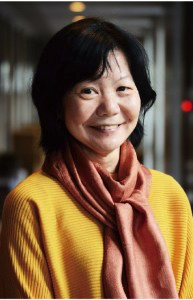
I wonder how, a decade ahead from now, our future colleagues might look back upon this year 2020. All our visiting scholars have gone home and their offices are left empty without nametags. No travel, no fieldwork, no conferences abroad or in Japan. Everyone is stuck either at home or in the office. On-line classes and meetings have become the norm, including conferences and seminars. Now, even I have been forced to learn the new technology and have no problem connecting with a colleague or a friend over zoom for a consultation or chit-chat.
But as some things are left mid-air we have, it seems, now entered into a ‘new normal’. How convenient that we don’t have to go to Tokyo for every two-hour meeting! How practical that some of us work at home without spending the time commuting. How nice to be with family or to have a spouse be at home for once. As researchers, we have full loads of questions to ask ourselves and the people in our field sites. So let’s hope that ten years from now, we will look back and say, that this has been a turning-point year, rather than a ‘lost year’.
At our Center, earlier in April, we launched a new ‘Corona Chronicles’ section of our website, gathering voices from many different locations – mainly in Southeast Asia but also from other locations across the globe – affected by the virus in diverse and unexpected ways. We began slowly by soliciting submissions from our friends and colleagues, but gradually it grew into a recognized venue, as unsolicited submissions began to arrive. How the virus hit our everyday lives depends greatly on where we are, who we are, and what we do. COVID-19 has delineated previously blurry lines of differentiation, it has devastated many economically, widened the economic gap, reinforced discrimination, and drawn attention to the ways we relate to and communicate with others both far and near. So the virus brings both a wide range of changes to all of our lives.
This year, the cherry blossoms bloomed very quietly in our courtyard and some important events that we had been anticipating have been left waiting. This includes a greatly missed opportunity for hearing the retirement speech of Professor Kazuo Ando, who retired in March 2020. Beginning as an agronomist, more than anyone else he has impressed his footsteps and disseminated his ideas regarding the future of farming communities in Bangladesh, in Myanmar, in Japan, and wider on the globe. Unfortunately, we have yet to hear our Big Brother Ando-san’s words upon his retirement.
We did, however, also have two new welcome developments in the past half year. Firstly, we had Professor Michael Feener join us as a new faculty member on April 1. Arriving from Oxford, he and his family miraculously slipped through customs and quarantine just in the nick of time as the Japanese government announced the closing of airports on the same day of his arrival. So with this auspicious start, Michael is now with us. He has also brought with him a new extension of his work in the Maldives so CSEAS is now also the home of the Maritime Asia Heritage Survey. The project resonates well with our Center’s emerging orientation towards thinking beyond and across regions and we hope to learn from it.
Secondly, the renovation of our East Building has now been completed. Faculty and research members moved into offices on the upper floors in August, and as of September, the first floor, which is primarily space for common use, has also been opened. In particular, the Research Commons was designed by architects from KU’s Engineering Department. Inspired by the ambience of the room looking onto the inner yard, the room is designed as a creative space for small group meetings to talk about research ideas, for quietly reading while overlooking the yard, or for events and exhibitions. May there be many ideas emerging from this room, and many interesting events taking place in the near and far future.
COVID-19 has not stopped us although we are reconsidering some of our core research activities. As the gates are gradually opening up, we look forward to receiving our visitors again soon.
Yoko Hayami
Director, CSEAS